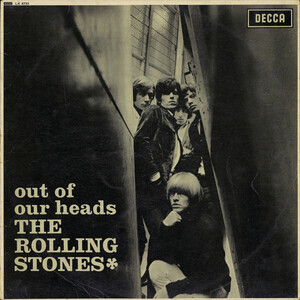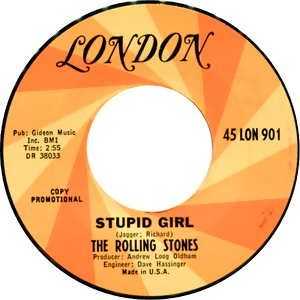
"Street Fighting Man" is a song by the English rock band the Rolling Stones, written by the songwriting team of Mick Jagger and Keith Richards. Considered one of the band's most popular and most controversial songs, it features Indian instrumentation contributed by Brian Jones, which has led to it being characterized as a raga rock song. It also features controversial and ambiguous lyrics about armed revolution. In the United States, it was released as a single in August 1968, while it was not released in the United Kingdom until four months later on the Beggars Banquet album, where it opened side two. The B-side of the American single featured "No Expectations", considered one of the final Stones tracks in which founding member Jones played a significant role in its construction. And it was the final Rolling Stones single on which Jones performed.

Let It Bleed is the eighth studio album by the English rock band the Rolling Stones, released on 28 November 1969 by London Records in the United States and on 5 December 1969 by Decca Records in the United Kingdom. Released during the band's 1969 American Tour, it is the follow-up to Beggars Banquet (1968), and like that album is a return to the group's more blues-oriented approach that was prominent in the pre-Aftermath (1966) period of their career. Additional sounds on the album draw influence from gospel, country blues and country rock.

Beggars Banquet is the seventh U.K. and ninth U.S. studio album by the English rock band the Rolling Stones, released on 6 December 1968 by Decca Records in the United Kingdom and by London Records in the United States. It was the first Rolling Stones album produced by Jimmy Miller, whose production work formed a key aspect of the group's sound throughout the late 1960s and early 1970s.

Out of Our Heads is the third studio album by the English rock band the Rolling Stones, released in two editions with different covers and track listings. In the US, London Records released it on 30 July 1965 as the band's fourth American album, while Decca Records released its UK edition on 24 September 1965 as the third British album.

The Rolling Stones Rock and Roll Circus is a British concert film hosted by and featuring the Rolling Stones, filmed on 11–12 December 1968. It was directed by Michael Lindsay-Hogg, who proposed the idea of a "rock and roll circus" to Jagger. The show was filmed on a makeshift circus stage with Jethro Tull, The Who, Taj Mahal, Marianne Faithfull, and the Rolling Stones. John Lennon and his fiancee Yoko Ono performed as part of a one-shot supergroup called The Dirty Mac, featuring Eric Clapton on guitar, Mitch Mitchell on drums, and the Stones' Keith Richards on bass. The recently formed Led Zeppelin had been considered for inclusion, but the idea was rejected.

Metamorphosis is the third compilation album of the Rolling Stones music released by former manager Allen Klein's ABKCO Records after the band's departure from Decca and Klein. Released in 1975, Metamorphosis centres on outtakes and alternate versions of well-known songs recorded from 1964 to 1970.
"Ventilator Blues" is a song by the English rock band the Rolling Stones that is included on their 1972 album Exile on Main St.
"Dead Flowers" is a song recorded by the Rolling Stones. Written by Mick Jagger and Keith Richards, it appears on their 1971 album Sticky Fingers as the fourth track of side two.
"No Expectations" is a song by English rock band the Rolling Stones featured on their 1968 album Beggars Banquet. It was first released as the B-side of the "Street Fighting Man" single in August 1968. The song was recorded in May 1968. Brian Jones' acoustic slide guitar on the recording represents one of his last major contributions before leaving the band.
"Can't You Hear Me Knocking" is a song by English rock band the Rolling Stones from their 1971 album Sticky Fingers. The track is over seven minutes long, and begins with a Keith Richards open-G tuned guitar intro. The main song lasts for two minutes and 43 seconds, after which it transforms into an extended improvisational jam. The entire track was captured in one take, with the jam being a happy accident; the band had assumed the tape machine had been stopped, and were surprised to find the entire session had been captured. Originally they were going to end the song before the jam started, but were so pleased with the jam that they decided to keep it in. Besides the regular Rolling Stones members Mick Jagger (vocals), Keith Richards, Mick Taylor (guitar), Charlie Watts (drums) and Bill Wyman (bass), the track also features conga player Rocky Dijon, saxophonist Bobby Keys, organist Billy Preston and additional percussion by producer Jimmy Miller.
"Midnight Rambler" is a song by English rock band The Rolling Stones, released on their 1969 album Let It Bleed. The song is a loose biography of Albert DeSalvo, who confessed to being the Boston Strangler.
"Goin' Home" is a song recorded by the English rock band the Rolling Stones. Written by Mick Jagger and Keith Richards, it was the longest popular music song at the time, coming in at 11 minutes and 35 seconds, and was the first extended rock improvisation released by a major recording act. It was included as the sixth track on side one of the United Kingdom version and the fifth track on side two of the American version of the band's 1966 studio album Aftermath.
"You Got the Silver" is a song by the English rock and roll band the Rolling Stones from their 1969 album Let It Bleed. It was also released as the B-side to the "Let It Bleed" single in Japan.
"Salt of the Earth" is the final song from English rock band the Rolling Stones album Beggars Banquet (1968). Written by Mick Jagger and Keith Richards, the song includes an opening lead vocal by Richards. It is the second official track by the group to feature him on lead vocal.
"Stray Cat Blues" is the eighth song on the Rolling Stones' album Beggars Banquet. It was written by Mick Jagger and Keith Richards and produced by Jimmy Miller. Miller's production of the song is very representative of his style, featuring a very prominent hi hat beat, droning piano performed by Nicky Hopkins, a mellotron performed by Brian Jones, all electric guitars performed by Richards and vocals from Jagger kept even in the mix. According to Mick Jagger, the song was inspired by "Heroin" by the Velvet Underground, with the intros of both songs being particularly similar.

"The Spider and the Fly" is a song by English rock band the Rolling Stones, recorded in May 1965 and first released on the US version of their 1965 album Out of Our Heads. In the UK, it was released as the B-side to "(I Can't Get No) Satisfaction". In 1971, the song was released on an album for the first time in the UK on the Decca Records compilation Stone Age.

"Stupid Girl" is a song recorded by the English rock band the Rolling Stones. Written by Mick Jagger and Keith Richards, the song featured on the band's 1966 album Aftermath. It was also issued as the B-side of the U.S. "Paint It Black" single.
"Hey Negrita" is a song by English rock band the Rolling Stones that appeared on their 1976 album Black and Blue.
"Send It to Me" is a song by English rock and roll band the Rolling Stones featured on the 1980 album Emotional Rescue.
"Dear Doctor" is a song by English rock and roll band the Rolling Stones featured on their 1968 album Beggars Banquet.







